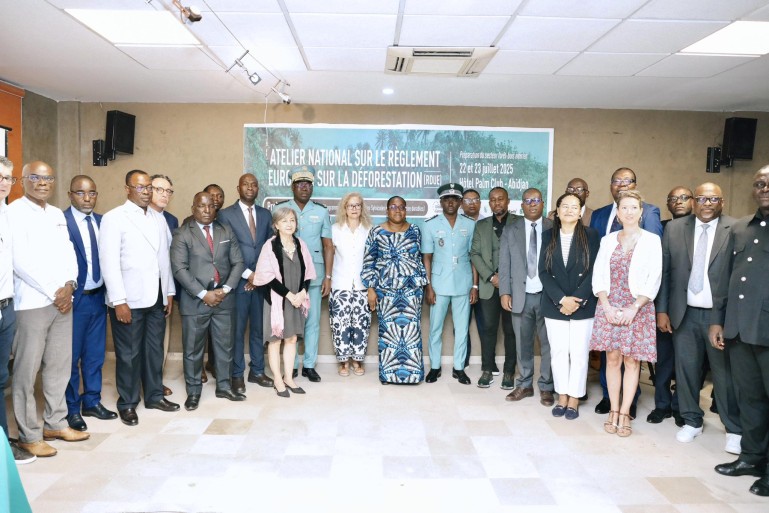

28.07.2025
On July 22 and 23, 2025, a national workshop on the European Union Regulation on imported deforestation (EUDR) was held in Abidjan, co-organized by MINEF-RCI, ATIBT, SPIB, and EFI, as part of the PASSAD-Forêts project funded by the European Union.

The workshop aimed to strengthen the Ivorian private sector's understanding of the forestry and timber industry's requirements under the EUDR and to structure the sector's preparations.
The first day was opened by General Zouzou Elvire Joelle, Chief of Staff to the Minister of Water and Forests, Ms. Cecilia Costa for the European Union Delegation, Mr. Boubacar Ben Salah, President of SPIB, and Nathalie Bouville, Communications Manager at ATIBT. Discussions focused on the definitions of the terms “forests,” “deforestation,” and “degradation” in the context of the EU Timber Regulation and on the issue of the compatibility of timber from different types of forests in the Ivorian context (plantations, classified forests, agroforests).
The second day, moderated by Caroline Duhesme (ATIBT), provided an opportunity to take stock of existing national tools. Mr. Botebo Kidoh Marius (MINEF) presented the legality grids, Mr. Gethème outlined the evolution of the SNVLT, and Mr. Yeo (Inprobois) illustrated an example of an internal traceability system. These presentations provided a better understanding of the points of convergence and divergence with the requirements of the EU Timber Regulation in terms of proof of legality, geolocation, and traceability in supply chains.
The workshop was characterized by the strong involvement of the 70 participants over the two days. Each session gave rise to lively discussions and genuine co-construction to establish the next steps.
An initial set of recommendations has been discussed. These will be refined in the coming weeks.
• Land security: encourage clarification of land use and ownership and anticipate potential changes (PEF).
• Traceability: co-develop manuals adapted to the Ivorian context and meeting EU due diligence requirements.
• Legality: create standard evidence files, strengthen human rights and environmental issues in the grids.
• Forest: clarify the status of agroforests and land use through an inter-institutional task force.
• Support for SMEs: structure a support and training plan in conjunction with the SPIB.
• Communication: promote legal Ivorian production to European importers and authorities.
Through the PASSAD-Forêts project, ATIBT is fully committed to supporting Ivorian companies in this strategic regulatory transition by facilitating public-private dialogue and the recognition of legal timber on international markets.
ATIBT channel on YouTube
ATIBT channel on YouTube